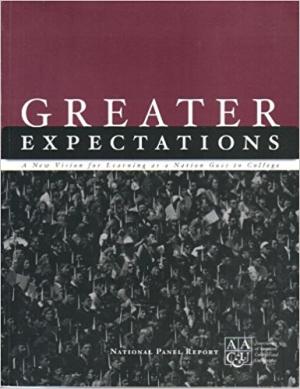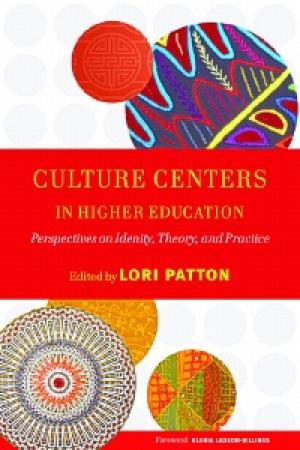Resources
This article examines sexuality, a null curriculum in Asian-American faith communities, and explores pedagogical strategies to move the sexuality discourse to the explicit curriculum. The article first describes the current discussion of sexuality in Asian-American communities, then it critically analyzes the Confucian notion of the body, which has far-reaching influence on Asian-American views about sexuality, including those of Christians. The article then focus on demystification of the body, arguing that demystification is fundamental to Asian-American discussions about sexuality. Finally, it suggests pedagogical strategies for the teaching of sexuality in Asian-American contexts.

This report of the Greater Expectations National Panel calls for a new focus on excellence to better prepare students for the 21st century world. The report recommends the creation of a New Academy characterized by high expectations, a focus on learning, commitment to demonstrated achievement, intentional practices, and an engaged, practical liberal education for all students. (From the publisher)
This article builds upon the theological insights of feminist and womanist theologians with respect to the sin of self-hate, and explores the ways in which gay male cyberculture inhibits the spiritual development of gay Asian men. 
The article synthesizes and critiques the social science, education, and adult education literature related to the examination of Whiteness and White privilege and offers recommendations for the field of adult education. By examining the historically changing nature of Whiteness, the major themes in this literature are discussed, along with the relevance of these themes for adult education research and practice. In reviewing the current efforts to name and challenge White privilege, the article provides recommendations for moving beyond naming and critiquing White privilege and racism in the field of adult education to challenging and transforming their impact.
This article presents an alternative approach to using service-learning courses to help students develop cultural competence. Service learning often comes from a deficit model that views the providers of a service as advantaged and the recipients as disadvantaged. The Conceptual Model for Cultural Engagement (CMCE) recognizes that those many deem as the disadvantaged have assets to share. The CMCE develops long-term, asset-based, reciprocal relationships between faculty members, community partners, and higher education students. During this relationship, all of the individuals actively participate in culturally engaged learning. The goal is to develop culturally effective members of our society who are educated to interact effectively with individuals from diverse backgrounds.
Wisdom or questing to know God and the world evokes fear through case studies of the controversial Reimagining Conference and the race related responses to the O. J. Simpson verdict, the fear of knowing God (which included the fear of questioning dominant metaphors of God) and the fear of knowing ourselves are explored. From this analysis, a view of wisdom is proposed and also an approach to education that inspires and encourages people to seek to know and respond to God and the world.
Poetry is a bridge across diverse realities; it bridges the expressible and inexpressible, the present and the future. Poetry is also a powerful force in human life; it reveals, nourishes, binds, critiques, empowers, constructs, and confront. From such movement come visions for educational action, both actual and metaphoric. These include: dancing, meditating, singing, chanting, improvising, and drumming.

Are cultural centers ethnic enclaves of segregation, or safe havens that provide minority students with social support that promotes persistence and retention? Though Black cultural centers boast a 40-year history, there is much misinformation about them and the ethnic counterparts to which they gave rise. Moreover, little is known about their historical roots, current status, and future prospects. The literature has largely ignored the various culture center models, and the role that such centers play in the experiences of college students. This book fills a significant void in the research on ethnic minority cultural centers, offers the historic background to their establishment and development, considers the circumstances that led to their creation, examines the roles they play on campus, explores their impact on retention and campus climate, and provides guidelines for their management in the light of current issues and future directions. In the first part of this volume, the contributors provide perspectives on culture centers from the point of view of various racial/ethnic identity groups, Latina/o, Asian, American Indian, and African American. Part II offers theoretical perspectives that frame the role of culture centers from the point of view of critical race theory, student development theory, and a social justice framework. Part III focuses specifically on administrative and practice-oriented themes, addressing such issues as the relative merits of full- and part-time staff, of race/ethnic specific as opposed to multicultural centers, relations with the outside community, and integration with academic and student affairs to support the mission of the institution. For administrators and student affairs educators who are unfamiliar with these facilities, and want to support an increasingly diverse student body, this book situates such centers within the overall strategy of improving campus climate, and makes the case for sustaining them. Where none as yet exist, this book offers a rationale and blueprint for creating such centers. For leaders of culture centers this book constitutes a valuable tool for assessing their viability, improving their performance, and ensuring their future relevance – all considerations of increased importance when budgets and resources are strained. This book also provides a foundation for researchers interested in further investigating the role of these centers in higher education. (From the Publisher)
Wabash Center Staff Contact
Sarah Farmer, Ph.D
Associate Director
Wabash Center
farmers@wabash.edu